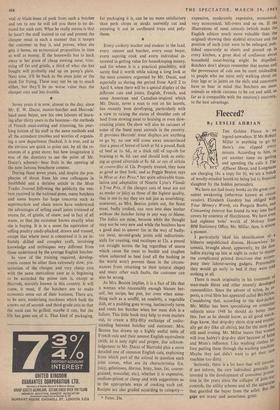Fleeced?
By LESLIE ADRIAN
We have not had many books on the great con- sumer awakening (otherwise known as caveat vendor). Elizabeth Gundrey has obliged with Your Money's Worth, via Penguin Books, and Consuming Interest has found its way into hard covers by courtesy of Hutchinson. We have even had eighteen bobs' worth of Molony from HM Stationery Office. Mr. Millar, then, is almost a pioneer. I particularly liked his identification of a hitherto unpublicised disease, Housewives' In- somnia, brought about, apparently, by the dear ladies staying up late at night in order to maste`,. the complicated printed directions that accom- pany their labour-saving gadgets. PresumahlY nothing g yhinwoautldallo early to bed if they were told There is much originality in his treatment cif man-made fibres and other recently developed commodities. Since the advent of nylon, he re- ports, a rival fibre has appeared called Bri-NYlutt. Considering that, according to the dust-jacket, Mr. Millar has been specialising on consumer subjects since 1948 he should do better than this. Just as he should know, as all good watch- dogs know, that drip-dry shirts drip and eventu- ally get dry (like all shirts), but for the most Oar' still need ironing. Mr. Millar insists that worne.n ,. will iron hubby's drip-dry shirt-because of hat" and Mum's influence. Like washing clothes be fore putting them through the washing machine Maybe they just didn't want to get the new machine too dirty. Seriously, there is a lot here that will interest, if not inform, the rare individual generally in- terested in the development of consumer Protec- tion in the years since the collapse of post-War controls, the utility scheme and all the apparatus that guarded the buyer from the seller. But tbe gaps are many and sometimes great. Apart from a spirited attack on hire purchase and a descant on bank charges, Mr. Millar chooses to ignore the service industries entirely. With Private Members' Bills to register travel agents and estate agents lately before the House, this seems a deplorable oversight. Again, in his discussion of pricing he says little or nothing about resale price maintenance. In • the final chapter 'Who will be the Shepherd?' he dis- cusses the proposed. Consumer Council and its link with the Citizens' Advice Bureaux without a whisper about the vigorous local consumer group movement. Worst of all, he says not a single word about this column.
Fair play, though. There are some interesting discussions. For example, of the reluctance of the average shopper to accept an honest bargain --like Square Deal Surf or Bibby's Coronet soap, marketed at 7d. instead of the usual I Id. or Is. Housewives, especially, it seems, would not like to be seen by the neighbours buying a 'cheap' hue of goods. Paradoxically, this does not apply to the undoubtedly cheap and good lines sold through Boots and Marks and Spencer (though Mr. Millar does not pursue this very far). What seems to irk him most (perhaps because his wife is, he complains, a member of the affluent flock) is the carelessness of so many shoppers, who pay no attention to .brand names, never keep a budget, seldom complain of or return defective goods (unless they are costly) and believe nearly everything they are told—except apparently on TV, where commercials, he considers, have some- times reduced sales instead of increasing them.
I finished reading these 200-odd. pages without having any clear idea whether we were the vic- tims of our own stupidity and gullibility or of the great capitalist marketing machine. In a phrase. although The Affluent Sheep is a good `Mann! Doesn't that just inals. you feel guilty
all over!' loud bleat, I am not convinced that the author knows his muttons.
• In France the words appellation controlc5e on a wine label have a definite and binding meaning, supported by the full rigour of the law. It is not- only a matter of the regional or communal name on the label; the wine must be made from certain grapes, reach a certain alcoholic strength, and be limited to a specified quantity. In the case of Chateauneuf-du-Pape, for example, inferior bunches of grapes must be rejected. But there is nothing to stop the vigneron from making wine out of the rejected grapes and shipping it to Britain as via rouge.
If he cares to tell the shipper that the wine is in fact Chateauneuf-du-Pape, the name can ap- pear on the bottle and, as the labels will probably be supplied by the grower, so will the words appellation contrilee. This is legal, and not even deceitful, viewed from a certain angle. But, if we had gone into the Common Market, it would have become illegal, which, contrary' to the sanguine views of some wine-drinking commen- tators, would have meant scarcer and dearer wines in the higher categories.















































 Previous page
Previous page